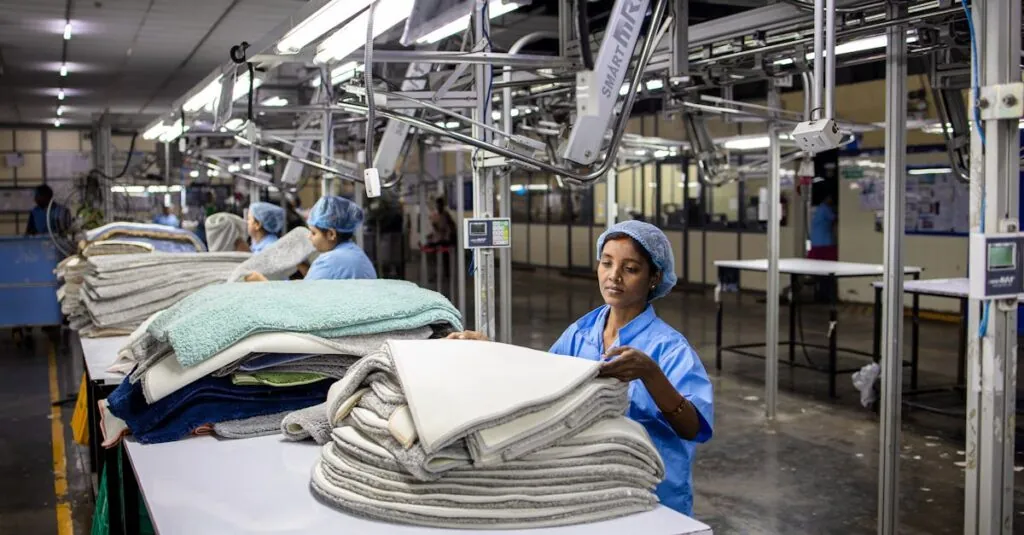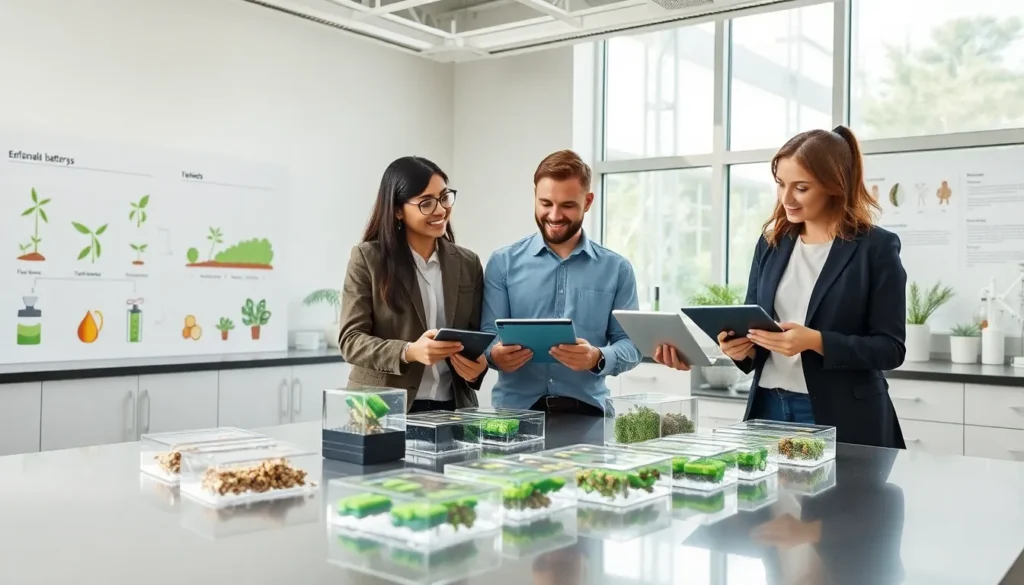Table of Contents
ToggleIn a world where plastic seems to have taken over like an uninvited party guest, plant-based packaging is the refreshing drink that everyone’s been waiting for. Imagine unwrapping your favorite snack and knowing that the packaging won’t outlive your great-grandkids. It’s not just a dream; it’s the new reality.
Plant-based packaging is here to save the day, combining sustainability with a dash of creativity. Made from materials like cornstarch and sugarcane, it’s like Mother Nature’s gift to the eco-conscious consumer. With the planet’s health on everyone’s mind, this innovative approach offers a guilt-free solution to the waste crisis. So, let’s dive into the world of plant-based packaging and discover how it’s not only good for the Earth but also a smart choice for businesses looking to make a positive impact.
Understanding Plant-Based Packaging
Plant-based packaging emerges as a revolutionary alternative to conventional plastic. It utilizes renewable resources, enhancing sustainability in various industries.
Definition of Plant-Based Packaging
Plant-based packaging refers to materials derived from renewable sources, such as plants. Common materials include cornstarch, sugarcane, and other biomass. These substances decompose naturally, offering a biodegradable option in contrast to traditional petroleum-based plastics. Policies worldwide increasingly emphasize reducing plastic waste, thus propelling the adoption of plant-based alternatives.
Benefits of Plant-Based Packaging
Plant-based packaging provides multiple environmental benefits. One significant advantage is its reduced carbon footprint compared to fossil fuel-derived plastics. These materials often decompose within months, minimizing waste in landfills. Furthermore, plant-based packaging supports biodiversity by utilizing agricultural byproducts, creating a circular economy. Consumers value ecological responsibility, driving businesses to adopt sustainable practices. Transitioning to plant-based packaging not only satisfies regulatory requirements but also enhances brand reputation.
Types of Plant-Based Packaging
Plant-based packaging includes various materials that offer eco-friendly solutions. Two main categories include biodegradable materials and compostable options.
Biodegradable Materials
Biodegradable materials break down into natural components over time. Derived from organic sources like corn and sugarcane, these materials decompose in specific environmental conditions. Products featuring biodegradable plastics minimize waste in landfills. Research shows that these materials can degrade within a few months to several years depending on conditions. Consumers increasingly opt for biodegradable options, aligning with their sustainability goals.
Compostable Options
Compostable options undergo decomposition into nutrient-rich compost. They require specific conditions to break down effectively, such as moisture and temperature. Made from plant materials, compostable packages return essential nutrients to the soil. Typically, these options decompose within 90 to 180 days in industrial composting facilities. Many businesses adopt compostable packaging to enhance environmental responsibility while appealing to eco-conscious customers.
Environmental Impact of Plant-Based Packaging
Plant-based packaging significantly contributes to environmental sustainability. This innovative packaging option positively influences various ecological aspects.
Reduced Carbon Footprint
Plant-based packaging reduces greenhouse gas emissions. Derived from renewable materials, it emits fewer carbon pollutants than traditional plastics. Research highlights that these materials can lower carbon output by up to 30% during production. By utilizing crops like corn and sugarcane, companies decrease reliance on fossil fuels. Adoption of this packaging helps businesses enhance their sustainability credentials while appealing to a growing market of eco-conscious consumers.
Waste Management Benefits
Plant-based packaging offers notable advantages in waste management. Biodegradable materials can decompose within months to years, reducing landfill pressures. Informed studies suggest that these materials break down faster than petroleum-based options. Compostable packaging transforms into nutrient-rich compost in industrial facilities, typically within 90 to 180 days. Businesses adopting these solutions support circular economies and improve waste processing efficiency, benefiting both their operations and the planet.
Challenges in Plant-Based Packaging
Plant-based packaging faces several significant obstacles that could impact its broader adoption. Cost and material limitations present substantial challenges in transitioning to this sustainable option.
Cost Considerations
Cost remains a primary barrier to the widespread use of plant-based packaging. Production expenses often exceed those of traditional plastic, making it less economically viable for some businesses. Price variations can occur based on the raw materials used, such as cornstarch or sugarcane. Companies transitioning may experience initial higher costs, which can deter adoption, especially in price-sensitive industries. Many businesses balance sustainability and affordability, exploring ways to reduce costs through innovative manufacturing processes.
Material Limitations
Material limitations also pose challenges in the plant-based packaging sector. Although biodegradable and compostable materials exist, they often lack the same durability and barrier properties as conventional plastics. Some plant-based options may not withstand extreme conditions, such as high humidity or temperature fluctuations. Additionally, the availability of sufficient raw materials can fluctuate due to agricultural factors, affecting supply stability. These constraints may lead to performance issues, making certain plant-based options unsuitable for diverse packaging needs.
Future of Plant-Based Packaging
Plant-based packaging is set to transform the industry with continuous advancements in technology and consumer demand. Innovations push the boundaries of what these materials can achieve while meeting sustainability goals.
Innovations and Trends
Emerging technologies focus on enhancing the properties of plant-based materials. Researchers explore bioengineered options that improve durability and functionality alongside biodegradability. Recent breakthroughs enable the creation of materials that maintain barrier properties similar to conventional plastics. Companies increasingly invest in smart packaging solutions, integrating features like freshness indicators. Trends also show a rise in collaborations between businesses and startups to accelerate sustainable packaging development. The shift towards plant-based packaging promotes not only environmental responsibility but also innovation in product design and functionality.
Market Growth Potential
The global market for plant-based packaging is expected to grow significantly in the coming years. Current estimates predict a compound annual growth rate (CAGR) of over 10% by 2027. Consumer preferences for eco-friendly options drive this demand, with surveys revealing that 74% of shoppers are willing to pay more for sustainable products. Retailers and manufacturers realize the importance of aligning with these values to capture market share. Investment in sustainable practices enhances brand loyalty and reputation. As governmental regulations continue to encourage the reduction of plastic use, the transition to plant-based alternatives becomes even more viable for businesses seeking to thrive in this evolving landscape.
Conclusion
The shift toward plant-based packaging marks a significant step in the quest for sustainability. As businesses recognize the importance of eco-friendly practices, adopting these materials can enhance their reputation and appeal to a growing base of conscious consumers.
While challenges like cost and material limitations exist, ongoing innovations promise to improve the functionality and affordability of plant-based options. The future looks bright as advancements in technology pave the way for more durable and versatile packaging solutions.
With increasing regulatory support and consumer demand, plant-based packaging is set to play a crucial role in reducing plastic waste and fostering a healthier planet. Embracing this change not only benefits the environment but also positions companies as leaders in the sustainable movement.




